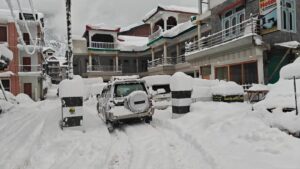PESHAWAR – The question of where Khyber Pakhtunkhwa’s (KP) Hindu and Sikh communities can cremate their dead returned to the Peshawar High Court (PHC) today—an issue that has lingered unresolved for more than a decade.
A two-member bench, comprising Justice Syed Arshad Ali and Justice Waqar Ahmad, heard the latest petition and asked the provincial government to submit a formal report. The petitioner’s lawyer, Advocate Taimur Khan, told the court that land had been identified in Kheshgi Bala in Nowshera but that it was owned by the tourism department. He also said that a request had been made for a dedicated bus to transport bodies to the site.
Justice Arshad Ali observed that the absence of a functioning provincial cabinet had created an administrative vacuum. “There is no cabinet—how will approval be granted?” he asked. The court then adjourned the case until 3 December.
The exchange echoed years of similar hearings and promises. Efforts to establish a shamshan ghat in Peshawar date back to the early 2010s, when members of the minority community began petitioning the government for a dedicated cremation site. Several announcements of land allocation have followed—each accompanied by official assurances and deadlines—but the site has never materialized.
The lack of progress has forced families to transport their dead long distances, often to makeshift sites in other districts. For many, the journey adds both financial burden and emotional strain to moments of mourning. At times, the absence of a local facility has led to hurried arrangements or even burial in place of cremation, which is against their religious beliefs.
Despite repeated judicial interventions, the case continues to drift through layers of bureaucracy. Successive governments have acknowledged the need for a proper cremation ground, yet each has cited procedural and administrative hurdles as the reason for delay.
Today’s hearing once again revealed the gap between judicial intent and executive will. For the province’s Hindu and Sikh communities, the outcome remains unchanged: a promise deferred, and the hope that the next court date might finally lead to the recognition—and land—they have long been waiting for.












